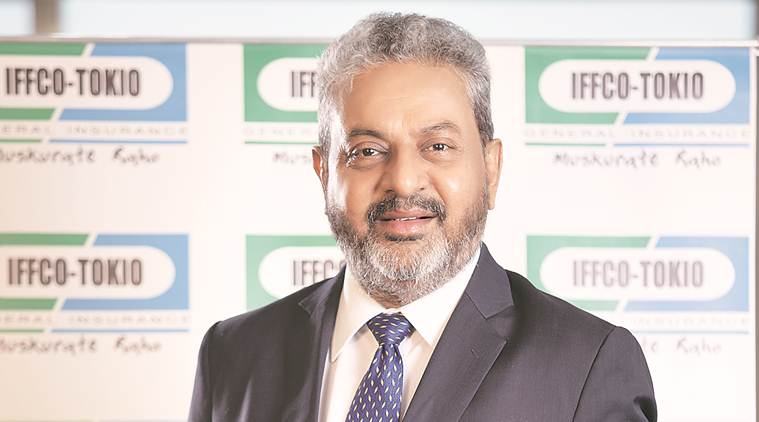 31-12-2019
31-12-2019
If young population takes health insurance, we would be able to subsidise premium for elderly

 Insurance Alertss
Insurance Alertss‘If young population takes health insurance, we would be able to subsidise premium for elderly’
Despite a broader economic slowdown, the general insurance industry continues to grow at around 15 per cent. Warendra Sinha, MD and CEO of IFFCO Tokio General Insurance, told The Indian Express that the industry will continue to grow at the same pace as the penetration remains low and also because the economic growth won’t be too bad for too long. Speaking about increasing penetration, he said that the industry is working on customising in a bid to provide right size insurance products that have lower premium, shorter tenure but high volume and also working on telematics-based products. Excerpts:
How has the economic slowdown impacted growth of insurance sector?
I would say that for now it has not been impacted. In fact, last 3-4 years have been leaping as far as growth is concerned. A couple of government schemes have played a major role: PM Fasal Bima Yojana (PMFBY) that came in 2016 and Ayushman Bharat Scheme. It has changed the portfolio mix. While motor insurance comes on top, it is followed by health and then the crop insurance.
Ten years ago, when government companies were undergoing business process restructuring it was projected that motor and health will grow at 15 per cent and that has been achieved. For many years, we were at penetration level of around 0.7 and today we are at 0.94 and that is after PMFBY and Ayushman Bharat. It tells the scope of business that still remains untapped.
I am upbeat about future growth. As we speak, the industry is growing at 16 per cent and I see the industry closing at anywhere between 15-18 per cent at the end of the year. I have seen the industry come a long way. In 2000, when the market opened up — private companies were allowed to come back again and broking fraternity was allowed to come for the first time, the premium of general insurance industry was Rs 10,000 crore and last financial year it closed at 17x.
So you don’t think that the slowdown will have any impact?
While it has not had impact as of now, the downturn will take its toll because if businesses don’t do as well as they were doing, then they would not want to pay insurance premium and if we see factories shutting down, it will lead to a dip in terms of insurance. I, however, keep an optimistic view. As of now, we have not seen a reduction in industry premium collections but a continued slowdown may hurt.
My feeling is that the economy will not be so bad because I think the government has done a lot of cleaning and it should turn around. Also, it is the US-China trade war that is manifesting all over the world. Since the penetration is low, it will help us grow and we will focus on health, motor and home products. Also, all insurance companies have got together to start a campaign. It is going to be a one-year campaign and will start soon. It will aim to bring about awareness and to educate the masses that insurance is for the benefit of people.
How is decline in automobiles sales hurting the sector?
There is a downturn in the auto sector and it is largely because of new vehicles. It impacts the premium collection because premium of new vehicles is higher. Also, when we get more of new vehicles, the claims ratio is almost 30 per cent lower than what it would be if we only have old vehicles. However, we have been helped by government measures such as increase in penalty under Motor Vehicles Amendment Act, 2019. Even today, almost 50 per cent of the vehicles remain uninsured since many don’t renew it after the first year.
Don’t you think that it is unfair that a lot of elderly don’t get health insurance and if they get, the premium is high?
As the CEO of an insurance company, it feels bad that when the earning goes down at old age, we cannot offer them insurance and if we do offer with exclusions, we raise the premiums. I feel horrible about it, but there is no option and which is why I feel that penetration must increase and young ones should take insurance. If the young population takes health insurance, we would be able to cross subsidise the premium for the elderly. I think that on an overall basis, the industry needs to raise volumes to be able to subsidise other consumers as in many cases the premiums for prohibitive for elders.
Today, group medical policy bleeds all insurance companies. I have nothing against them but the premium should be commensurate. However, even if they don’t pay commensurate premium, if the younger lot were to buy insurance, it would cross subsidise. Today a challenge for an insurance company on an overall basis is to have an operating cost of below 100 as then you make profit.
While penetration still remains low, how do you plan to increase it?
We are trying to open offices in smaller towns and rural areas and are working on smaller products that will cater to that segment of the society. The industry is working on customised bite size insurance products that have lower premium, shorter tenure but high volume.
It has already started. We have come up with Mosbite insurance. It covers vector borne diseases — malaria, dengue, chikungunya, Zika virus etc before the onset of the season- which is the vulnerable season. Another one for which we we have got a permission from IRDAI is an individual health policy — Swasthya Raksha Bima. It is small ticket sum insured, small premium product where if you get treatment in Tier 2-4 cities, there will be no deductible.
By the end of the current financial year, products based on telematics will come in India which essentially means you pay as you use. This is what foreign countries do. If you are elder citizen, your premium is low and if you own a fancy car you pay more premium. You can buy insurance for a month when you go out for a long drive. You can also take a cover for weekends if you take your vehicle out only during weekends. So in such case, the vehicle will be covered only during the weekend and the premium will be charged commensurately. It will not be pro-rata, but it will be much lower than what you pay annualised. We are collecting data and in the next fiscal, we should be ready to offer such products.
Source: The Indian Express
